Background
John Elmer Tropman was born on September 14, 1939 in Syracuse, New York, United States. He is a son of Elmer J. Tropman, a charity executive, and Elizabeth (Overfield) Tropman, a homemaker.

173 W Lorain St, Oberlin, OH 44074, USA
John Tropman received his Bachelor of Arts in Sociology from Oberlin College, Ohio in 1961.
5801 S Ellis Ave, Chicago, IL 60637, USA
John Tropman received his Master of Arts in Social Work and Social Service Administration from the University of Chicago, Illinois in 1963.
500 S State St, Ann Arbor, MI 48109, USA
John Tropman earned his Doctor of Philosophy in Social Work and Sociology from the University of Michigan in Ann Arbor in 1967.




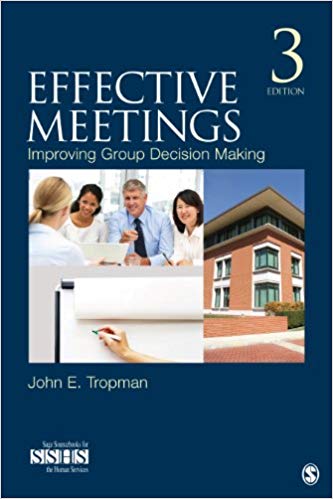
(Lauded for its accessible format and humorous writing sty...)
Lauded for its accessible format and humorous writing style, Effective Meetings: Improving Group Decision Making by John E. Tropman, offers practical strategies for running effective meetings by highlighting the processes involved in decision making and the ways individuals contribute to making better quality decisions as a group.
https://www.amazon.com/gp/product/B00JFC3XXU/?tag=2022091-20
1980
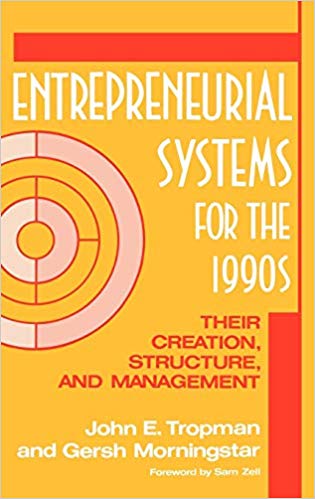
(A book for aspiring entrepreneurs both within and outside...)
A book for aspiring entrepreneurs both within and outside of established corporations, this book introduces a new perspective on the subject that both refutes individualistic myths about entrepreneurship and provides a specific theory about successful entrepreneurial activity. The authors point to the need for entrepreneurial systems - collections of individuals working together - as the real key to successful ventures.
https://www.amazon.com/gp/product/0899302882/?tag=2022091-20
1986
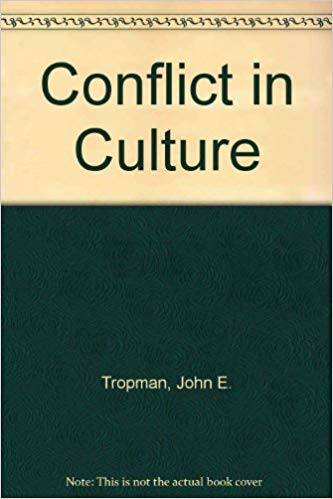
(Conflict in Culture analyzes American society's tendency ...)
Conflict in Culture analyzes American society's tendency to alternate between seeking permission to drink and imposing controls on drinking. It continues by exploring the underlying values of permission and control, as well as their implications on the history of alcohol attitudes in the United States.
https://www.amazon.co.uk/Conflict-Culture-John-Tropman/dp/0819152471/?tag=prabook0b-20
1986
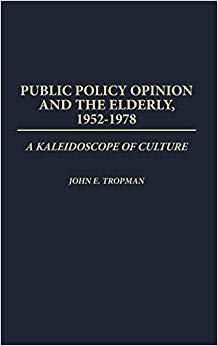
(John E. Tropman examines older Americans and public polic...)
John E. Tropman examines older Americans and public policy opinion between 1952 and 1978 in order to see just where elder citizens fit in the overall picture. Differences and similarities to opinions of younger groups are discussed along with the changes that took place from the conservative fifties to the liberal sixties and early seventies and back again to the conservatism of the late seventies.
https://www.amazon.com/gp/product/031325432X/?tag=2022091-20
1987
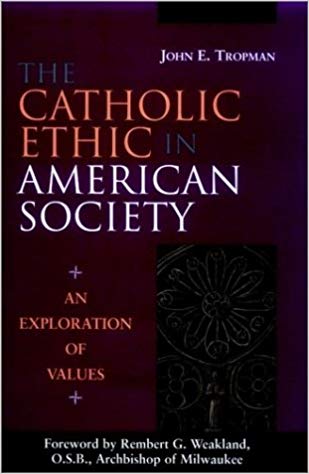
(Based on years of scholarly research, this book offers a ...)
Based on years of scholarly research, this book offers a fresh perspective of the Protestant ethic by contrasting it with the newly identified Catholic charity ethic.
https://www.amazon.com/gp/product/0787901237/?tag=2022091-20
1995
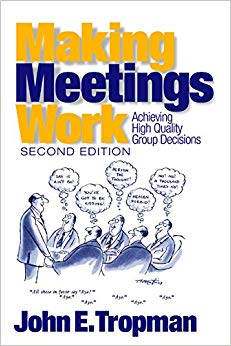
(The book covers everything you need to know about organiz...)
The book covers everything you need to know about organizing engaging meetings, including preparing agendas, controlling what happens behind the scenes prior to and after meetings, and managing conflicting values and personalities.
https://www.amazon.com/gp/product/B00YFRJLRM/?tag=2022091-20
1995
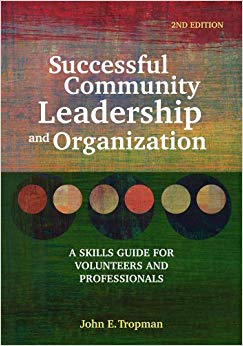
(The book addresses the common concerns and problems of lo...)
The book addresses the common concerns and problems of local community leaders and organizers and provides an easy-to-use set of skills and techniques that will enable leaders to implement best practices in their community work.
https://www.amazon.com/gp/product/0871014394/?tag=2022091-20
1997
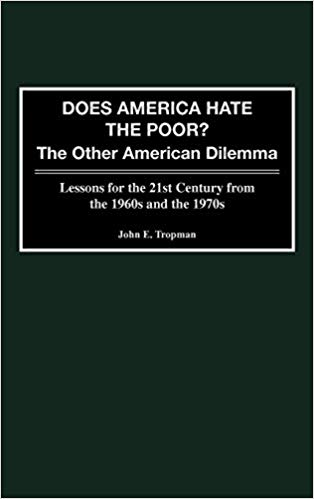
(Tropman examines American values and the two groups that ...)
Tropman examines American values and the two groups that threaten those values. One might wonder why, in the world's wealthiest society, do the poor seem so stigmatized. Tropman's answer is that they represent potential and actual fates that create anxiety within the dominant culture and within the actual poor themselves. The response in society is hatred of the poor, he contends, and among the poor themselves, self-hatred.
https://www.amazon.com/gp/product/027596132X/?tag=2022091-20
1998
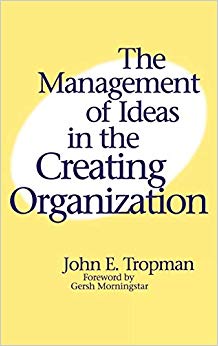
(This book introduces the concepts of IdeaManangement and ...)
This book introduces the concepts of IdeaManangement and IdeaLeadership as central positions and functions for the 21st century organization.
https://www.amazon.com/gp/product/1567201687/?tag=2022091-20
1998
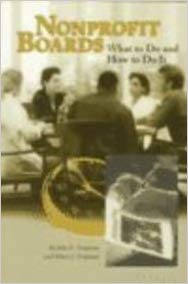
(This operator's manual for today's nonprofit board of dir...)
This operator's manual for today's nonprofit board of directors details the responsibilities of the board; explains how to articulate the nonprofit's vision and mission; describes processes for evaluating the board chair and directors; explains how to evaluate the board's decision making; and outlines how to improve the dreaded board meeting.
https://www.amazon.com/gp/product/0878686940/?tag=2022091-20
1999
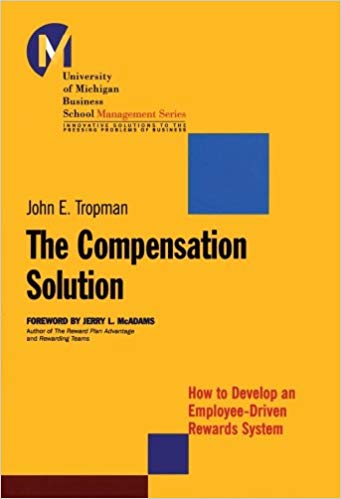
(Money isn't everything to today's employees. This book sh...)
Money isn't everything to today's employees. This book shows companies how to combine traditional compensation with the educational, emotional, and psychological benefits that will attract the best and brightest. It identifies the ten elements - including learning, advancement, emotional rewards, and quality of life - that job seekers rank highest among desired benefits. Then it shows employers how to combine them with monetary benefits to create effective, employee-driven compensation packages.
https://www.amazon.com/gp/product/B000QEIZBG/?tag=2022091-20
2001
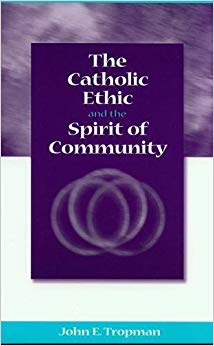
(This book fully explores the Catholic ethic and its diffe...)
This book fully explores the Catholic ethic and its differing focus by using both historical and survey research. It also points to the existence of other religious-based ethics. This clearly written book, employing the tools of both sociology and religious thought, will appeal to a wide audience, including students and scholars in disciplines informed by the influence of religion on politics and on social and economic behavior.
https://www.amazon.com/gp/product/B001HBI2CE/?tag=2022091-20
2001
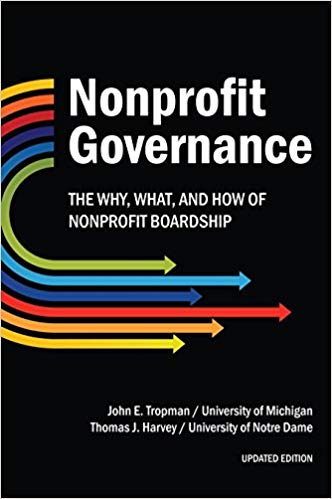
(This thorough volume offers up-to-date information and pr...)
This thorough volume offers up-to-date information and practical guidelines for board members and executives of non-profit organizations, large or small.
https://www.amazon.com/gp/product/0879465123/?tag=2022091-20
John Elmer Tropman was born on September 14, 1939 in Syracuse, New York, United States. He is a son of Elmer J. Tropman, a charity executive, and Elizabeth (Overfield) Tropman, a homemaker.
John Tropman received his Bachelor of Arts in Sociology from Oberlin College, Ohio in 1961. Two years later he received his Master of Arts in Social Work and Social Service Administration from the University of Chicago, Illinois.
In 1967 Tropman earned his Doctor of Philosophy in Social Work and Sociology from the University of Michigan in Ann Arbor.
John Tropman worked as an assistant professor at the University of Michigan in Ann Arbor from 1965 to 1970. In 1970 he became an associate professor, and in 1976 Tropman was appointed a professor there.
John Tropman is the director of Leadership in Community Benefit Organizations, a program initiated in the School of Social Work January 1, 2015 to organize and focus management content for management majors and Community Organization and Policy & Evaluation majors. His research focuses on the organizational elements that create high-performing human service (and other) organizations. Topics of special interest are entrepreneurship, effective group decision making, C-level executives, the problem of executive burnout and flameout, and organizational rewards systems.
Tropman is also interested in culture in general, and organizational culture in particular. His book "The Catholic Ethic in American Society" addresses this issue.
He is also the author of books such as "Conflict In Culture", " Does America Hate the Poor", "Effective Meetings", "Making Meetings Work", "New Strategic Perspectives On Social Policy", among others.
John Tropman received a number of awards, including Special Award from Vice President for Research of the University of Michigan in 1977 and 1981; the Bernard Zell/Leonard W. Lurie Prize for the Teaching of Entrepreneurship from the School of Business, University of Michigan in 1986-1987; Wilbur J. Cohen Award from the School of Education in 1988.
He also received the 1996 Choice Award for Outstanding Academic Books and the 1996 Blackwell's Choice, Outstanding Academic Books for his book "The Catholic Ethic in American Society".
In addition, John Tropman received the 2007 Social Work Legacy Award for the Tropman family from the National Association of Social Workers, Pittsburgh Chapter; the Achievement Award for Excellence from Wolverine Human Resources in 2009; and the 2013-2014 Distinguished Professor Award from the School of Social Work.
His most recent award is the Lifetime Achievement Award from the Association for Community Organization and Social Administration in 2015.
(This operator's manual for today's nonprofit board of dir...)
1999(A book for aspiring entrepreneurs both within and outside...)
1986(The book covers everything you need to know about organiz...)
1995(The book addresses the common concerns and problems of lo...)
1997(Based on years of scholarly research, this book offers a ...)
1995(This thorough volume offers up-to-date information and pr...)
(This book introduces the concepts of IdeaManangement and ...)
1998(Conflict in Culture analyzes American society's tendency ...)
1986(Lauded for its accessible format and humorous writing sty...)
1980(This book fully explores the Catholic ethic and its diffe...)
2001(Tropman examines American values and the two groups that ...)
1998(Money isn't everything to today's employees. This book sh...)
2001(John E. Tropman examines older Americans and public polic...)
1987
Quotations:
"I am a sociologist with a central interest in ideas values (ideas to which feeling is attached): the way values are structured, the way values change, and the way ideas/values emerge into policy."
"I write for two reasons: to help myself understand the variety of processes (social, psychological), their connections and interpretations; and to provide people doing things with guides to help them and their organizations achieve high performance."
John Tropman has been a member of the American Sociological Association, Council on Social Work Education, Society for Judgment and Decision Making, and Trout Unlimited, Nature Conservancy. He has also been a member of Non Profit Management Program and Organizational Behavior Program and a member of Executive Education Program of Carnegie-Mellon University.
Besides, Tropman was a member of Michigan Society of Fellows and was its chair in 1988-1989.
John E. Tropman married Penelope Savino on June 20, 1964. The couple has three children: Sarah, Jessica and Matthew.
